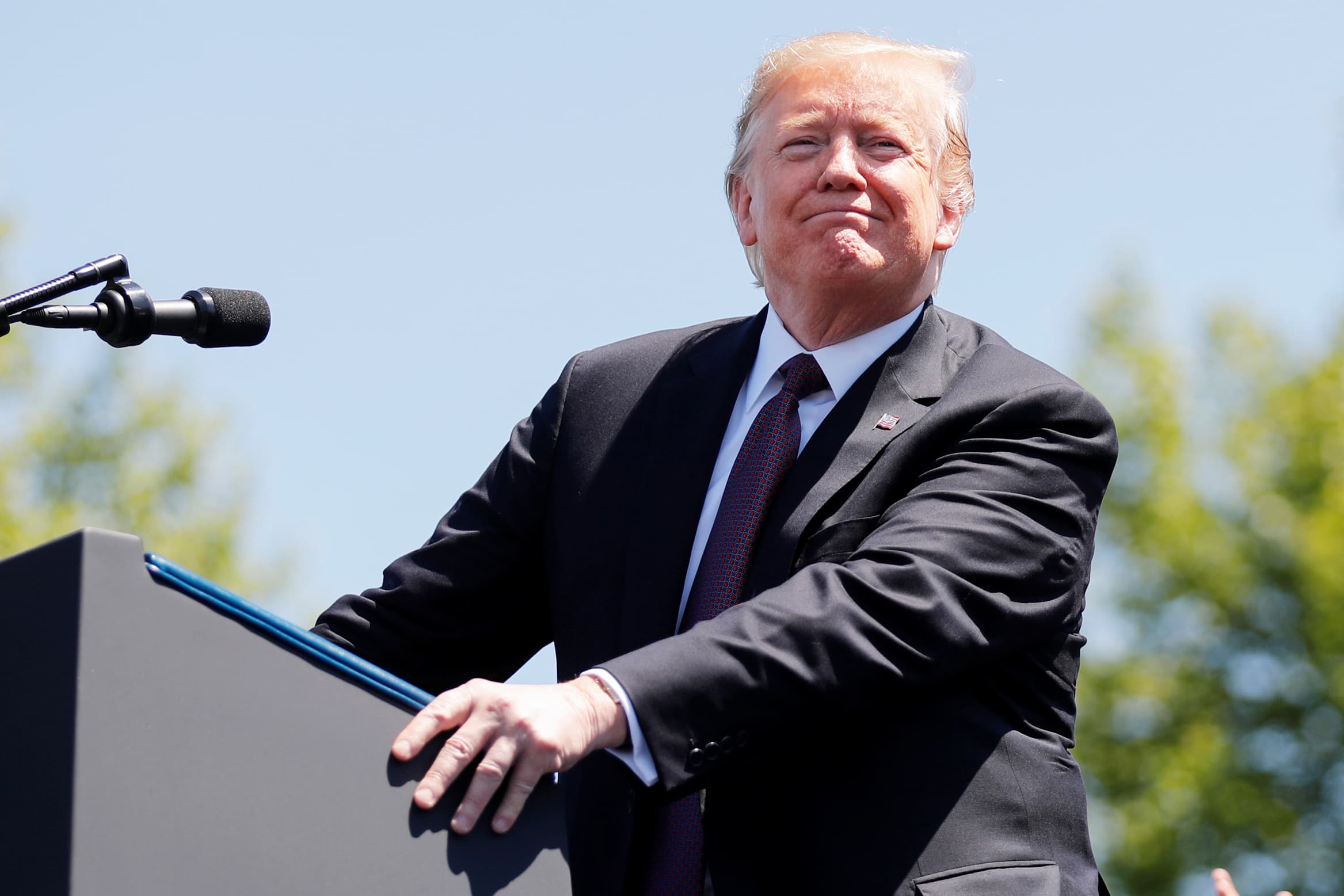
President Donald Trump speaks at the 38th Annual National Peace Officers Memorial Service on Capitol Hill in Washington, May 15, 2019.
Carlos Barria | Reuters
Chinese internet giants like Alibaba and Tencent are unlikely to be targeted in the same manner as telecommunications giant Huawei amid escalating trade tensions between Beijing and Washington, an analyst told CNBC on Thursday.
First and foremost, the deterioration of U.S.-China relations will likely hurt Chinese firms that compete with American companies, according to Gil Luria, director of research at D.A. Davidson.
"The focus on Huawei appears to be motivated by concerns regarding secrecy and intellectual property, but Huawei is also a main competitor to many American telecom equipment companies," Luria told CNBC.
"Companies that are domestic Chinese focused such as Alibaba and Tencent are less likely to be directly targeted," he said, adding that the former's sales in the U.S. are negligible and that outgoing Chairman Jack Ma has done a "masterful job of positioning himself as friendly to the U.S."
Still, he said, those firms would be unable to escape the secondary effects of a slowing Chinese economy — which has partially been pressured by heightened American tariffs.
'Long-reach' implications
U.S. President Donald Trump on Wednesday declared a national emergency over threats against American technology by signing an executive order that allows officials to block transactions involving information or communication technology that "poses an unacceptable risk" to American national security.
While Alibaba, Tencent, and even Baidu, may be spared from stringent restrictions on doing business in the U.S., other Chinese information technology firms could potentially suffer.
"The scope of the order is potentially far-reaching and could impact upon many mainland Chinese manufacturers of telecommunications equipment as well as communications services suppliers," Rajiv Biswas, chief economist for Asia Pacific at global data provider IHS Markit, told CNBC.
The latest escalation of the technology war between the world's two largest economies was reflected in the May 10 decision by the U.S. Federal Communications Commission to reject an application by China Mobile to provide communications services in the U.S. on national security grounds, Biswas said.
Following the executive order, the U.S. Department of Commerce said it was adding Huawei and its affiliates to the Bureau of Industry and Security (BIS) Entity List, which would make it more difficult for the Chinese telecom giant to do business with American companies.
Wednesday's moves from the Trump administration is a "grave escalation with China that at minimum plunges the prospect of continued trade negotiations into doubt," Paul Triolo, geo-technology practice head at political consultancy Eurasia Group, wrote in a note. "Unless handled carefully, this situation is likely to place U.S. and Chinese companies at new risk."
Huawei's networks of customers around the world could potentially be hit if the U.S. fully implements its moves against the Chinese firm because the company would be "unable to upgrade software and conduct routine maintenance and hardware replacement" since it would no longer have access to U.S. suppliers, according to Triolo.
Biswas agreed, saying the turn of events adds to uncertainties about the "long-reach" implications for non-Chinese communication companies that use parts made by Huawei and other Chinese network equipment providers.
"President Trump's executive order may also have wider geopolitical implications for key U.S. allies, such as the U.K. and other Western European countries that are considering allowing the use of Chinese communications equipment in their 5G rollouts," he added.
For its part, the U.S. is trying to convince allies to ban Huawei from participating in their plans for the next-generation high-speed mobile internet known as 5G. Washington claims that Huawei's technology risks potentially allowing Chinese espionage through those high-speed networks — but Huawei says the security concerns are unfounded. So far, European countries have resisted such calls from Washington but further restrictions could persuade international carriers to "immediately begin contingency plans," Triolo said.
While the expectation is for Beijing to retaliate with some countermeasures against U.S. communication companies to show a tough negotiating stance, Biswas said the broader "U.S.-China technology war is likely to be much more protracted than the trade war, since it is focused on U.S. national security concerns that cannot easily be resolved."
— CNBC's Tucker Higgins contributed to this report.
Correction: This article has been updated to reflect that Jack Ma is Alibaba's outgoing chairman.
No comments:
Post a Comment